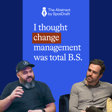
Ep 53: What it takes to lobby for Apple, Google & Intel with Matt Tanielian
What do you need to know if you're ready to launch a government affairs strategy? How do you find the right lobbyist? And how has lobbying for tech companies changed over the last decade?
Join Matt Tanielian, Co-founder of Franklin Square Group, a bipartisan government relations, as he shares key insights from his decades of experience advocating for tech companies and bridging the gap between Silicon Valley and Washington. D.C. From advising senators on foundation internet legislation like the Digital Millennium Copyright Act and the Microsoft antitrust investigation, to lobbying for Apple as it launched its first iPhone in 2008, Matt has been instrumental to tech firms as they navigate the intricacies of Capitol Hill.
Listen as Matt discusses how to work with politicians and government relations consultants, the value of joining coalitions and trade associations, the future of AI policy, and much more.
Read detailed summary: https://www.spotdraft.com/podcast/episode-53
Topics:
Introduction: 0:00
Attending law school in Washington, D.C.: 3:51
Working for a committee vs. working for a congressperson: 5:05
Questioning whether policy work requires a law degree: 7:12
Launching your own government relations firm: 10:17
Analyzing the evolving conversation around around tech in Washington: 13:15
Hiring your company’s first government relations consultant: 15:35
Joining and organizing coalitions and industry organizations: 20:58
Choosing who will represent your company in D.C.: 26:20
Avoiding common mistakes: 28:30
Envisioning the future of AI policy: 30:32
Advising companies during an election year: 34:42
Tracking the changing nature of lobbying: 36:09
Book recommendations: 38:14
Lobbying vs. government relations: 40:23
What you wish you’d known as a young lawyer: 42:47
Connect with us:
Matt Tanielian - https://www.linkedin.com/in/matttanielian/
Tyler Finn - https://www.linkedin.com/in/tylerhfinn
SpotDraft - https://www.linkedin.com/company/spotdraft
SpotDraft is a leading contract lifecycle management platform that solves your end-to-end contract management issues.
Visit https://www.spotdraft.com to learn more.



















